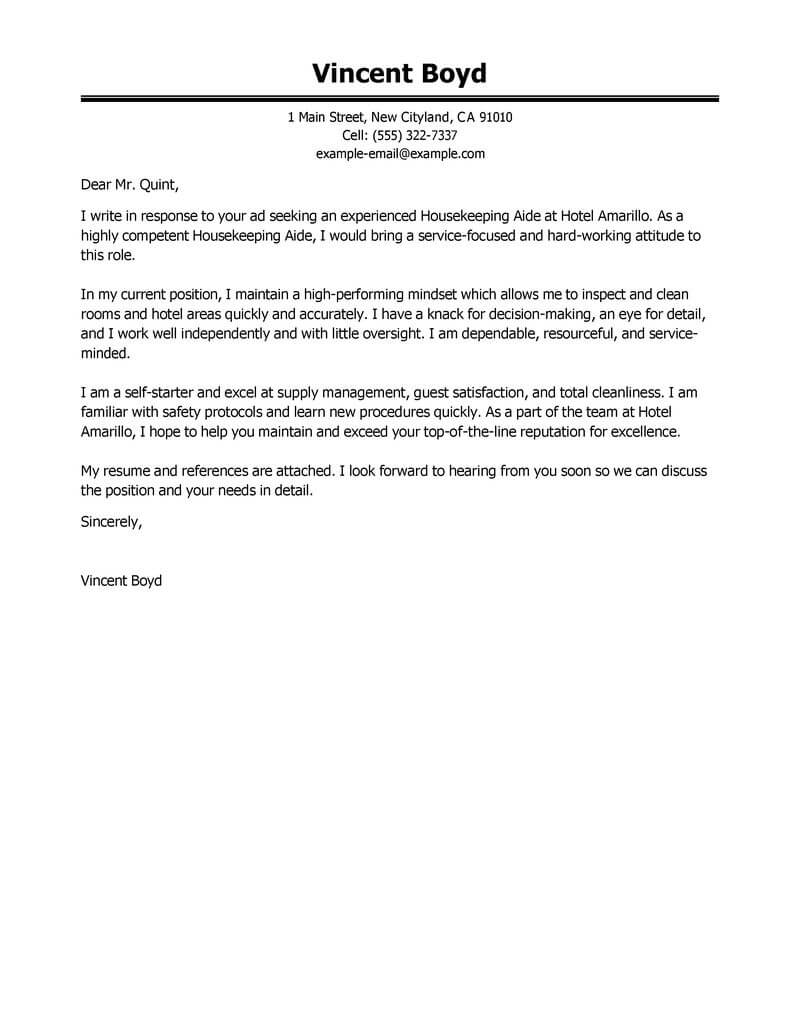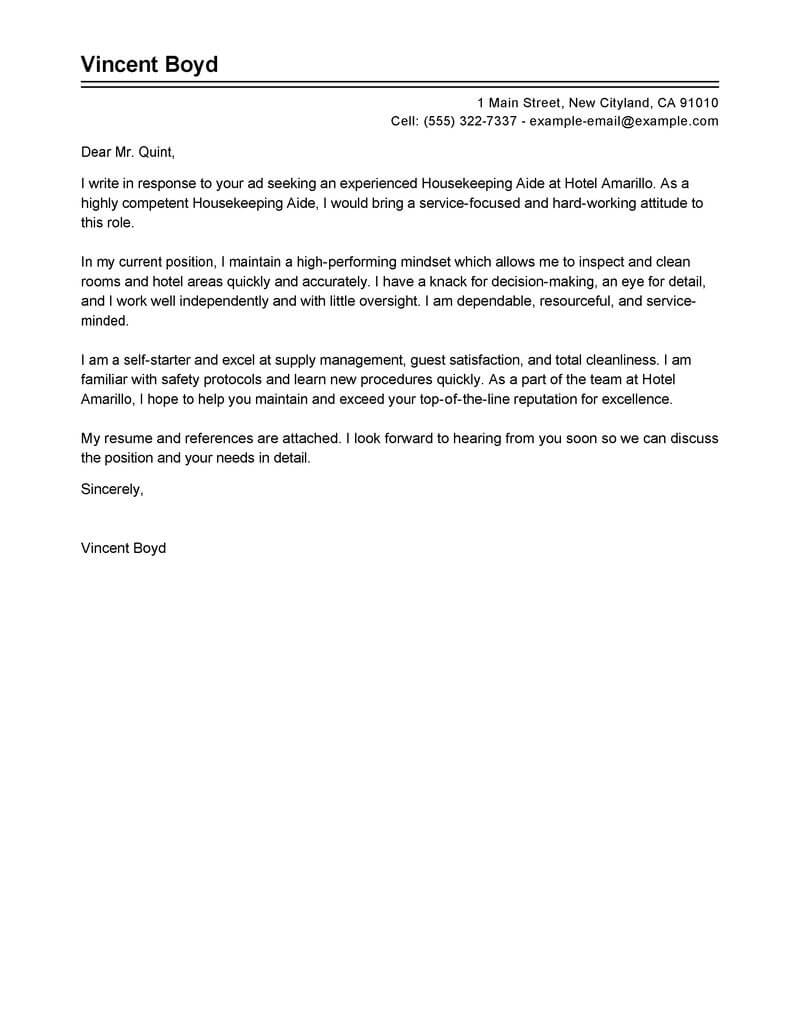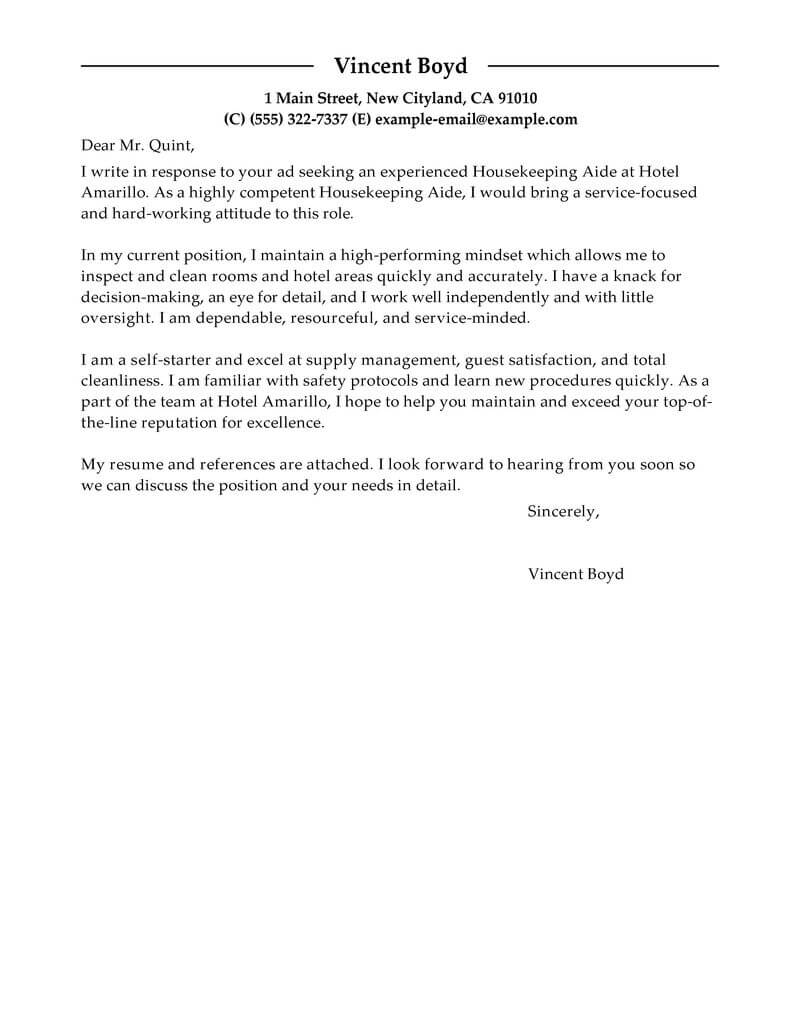Best Housekeeping Aide Cover Letter Examples
Published: Wednesday 9th of May 2018; Words Count: 1200
Every resume should be accompanied by a clever cover letter that introduces you to the hiring manager. Discover how to craft a polished cover letter by using this housekeeping aide cover letter example and the following lists of dos and don’ts.
- Do customize your cover letter for each employer so it doesn’t come across as generic and not focused on their company. In the example, he specifically mentions helping the company to maintain their Âtop-of-the-line reputation.”
- Don’t feel like you must follow a specific format. You can get creative, especially if you are applying for a creative position.
- Do start with a template, like the example here. You can use it as a guide to ensure you are including all the important information.
- Don’t be too formal. Notice in the example how he is professional without seeming stuffy or unnatural.
- Do look at examples for inspiration. Sometimes it is hard to know where to start, so look over the example to see how this person explained his skills and highlighted why he’s a good fit for the job.
Housekeeping Aide Advice
To get a position as a housekeeping aide, you’ll need a professional cover letter. That why we’ve compiled a multiple cover letter examples for housekeeping aide positions. Just click on any of the specially-designed cover letter examples below, and customize the text to fit your own situation. Get started today, and put yourself on the road to a new job as a housekeeping aide sooner!

Cover Letter Tips for Housekeeping Aide
Sometimes the job you have just isn’t the one you want. While they say the best time to look for work is when you’re working, you have to be careful. Here are some dos and don’ts for job hunting under your employer’s nose.
- Don’t tell anyone that has even a remote connection to your job. You may end up contacting a colleague or rival company that might be interested, but make discretion a priority. One exception is when everyone knows layoffs are pending. It’s a time where openly looking for work is acceptable.
- Avoid publicly reporting you’re looking for a job. While you definitely want to keep your LinkedIn and other professional profiles up-to-date, and have an updated cover letter ready to go, share the information quietly.
- If hiring managers ask about why you want to leave your job, reveal how you’re looking for new opportunities, hit the ceiling professionally, and they’re a company you admire and would be honored to work for. Don’t talk negatively about current employers and never say anything like “more money. “
- As stated, unless layoffs are on the horizon, do not use current coworkers, supervisors or management as references. Make it clear to hiring managers you’d rather they not contact anyone you work with.
- Do not use company resources to search for new work. Many companies track what their computers are used for. They may also monitor phone calls. That means not listing any business information as contact info.

Housekeeping Aide Job Seeking Tips
Housekeeping Aide may be the friendliest place in the world, but when it comes to competing for a job, it’s dog-eat-dog. Your cover letter has to come out swinging, knocking other candidates to the side. Here are tips to help do that.
- Keep a master cover letter that contains anything you might ever want in your cover letter. Constantly update it, editing and adding as necessary. When the time comes, you’ll have a library of information to pull from, creating a tailored cover letter perfect for the situation in front of you.
- A social media cover letter is a good way to brand your identity. It has the distinction of being an online resource for recruiters that are looking for candidates with your skills, education and background. It can contain charts, graphs, images, video and anything else that brands you.
- If your field is in the creative arts, marketing or sales, an infographic cover letter could be an excellent way to catch a hiring manager’s attention. We’d keep a conventional cover letter on file anyway with a link to the infographic.
- Pump up your cover letter with numbers, facts and figures. If you supervised, put in how many people. If the project made or saved money, list how much. Generalized statements about “filing” and “handling customer complaints” no longer cut it.
- Include your LinkedIn URL because hiring managers will likely look for you anyway. Include any industry blogs you write, as long as they’re professional and family-friendly.






